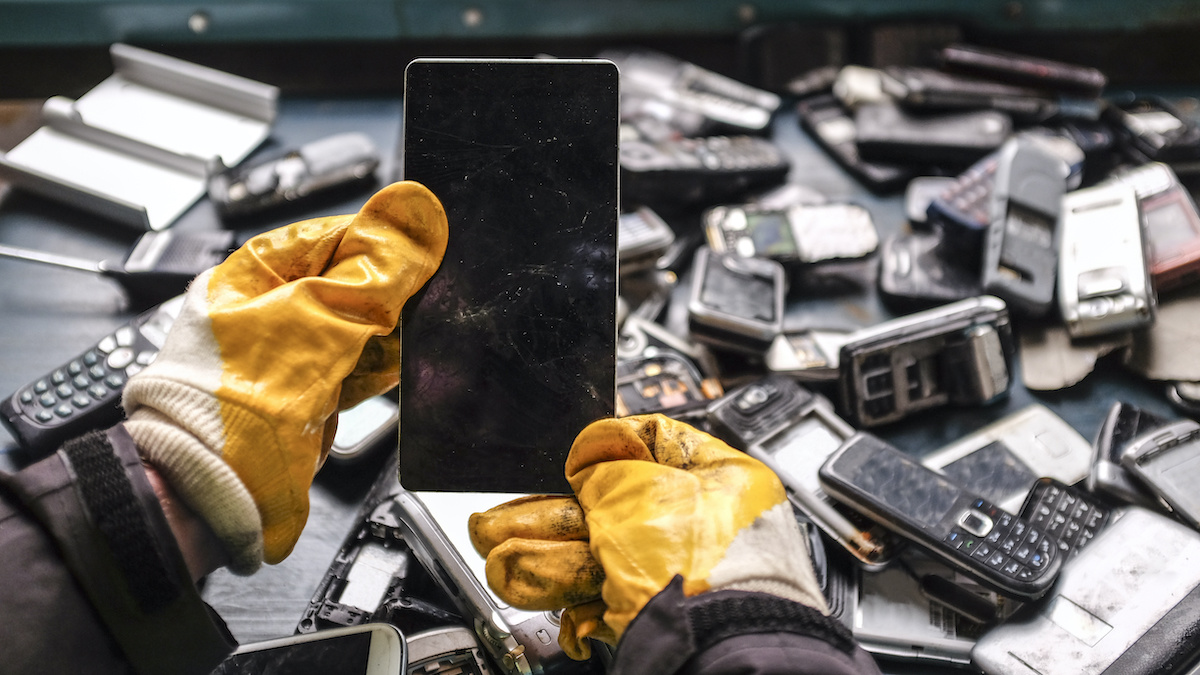

The EU wants to make it easier to repair a broken phone display. baranozdemir / iStock /Getty Images Plus
All those phones, computers and tablets we rely on are dependent on mined resources. Extracting and processing those resources accounts for nearly half of our greenhouse gas emissions, which is why the European Commission’s Circular Economy Action Plan calls for “initiatives for the entire life cycle of products, from design and manufacturing to consumption, repair, reuse, recycling, and bringing resources back into the economy.”
Essentially, the European Union wants to get rid of planned obsolescence, where manufacturers design a product with a short lifespan so consumers have to buy a new one, which leads to throwaway culture. To that end, the European Commission announced Wednesday that it will introduce laws to halve the amount of waste the EU produces by 2030. Right now, less than 40 percent of electronic waste in the EU is recycled.
The new laws will ensure that new products brought to the EU market are repairable, recyclable and designed to last longer than our current phones and tablets, according to Reuters.
“The goal, in the end, is decoupling resource extraction from our economic growth,” Environment, Oceans and Fisheries Commissioner Virginijus Sinkevicius told reporters in Brussels, as Deutsche Welle reported. He added, “The linear growth model of take, make, use and discard has reached its limits.”
The sweeping legislation will apply to a wide range of products, including mobile phones, textiles, electronics, batteries, construction and packaging, according to the BBC. The legislation that will make it easier to repair a broken phone display or to replace the battery is spurred by the Right to Repair movement.
It also updates current efficiency standards to apply to a broader selection of everyday items. The efficiency laws are outdated since they only apply to computers, televisions, dishwashers and washing machines, according to The Guardian.
Sinkevicius added that the electronic devices sector has “a massive impact” and “is constantly growing,” as Reuters reported. The European Union will not meet its target of zero-emissions by 2050 if it does not address the impact that mobile technology is having on the environment.
In addition to addressing the throwaway culture and planned obsolescence of mobile devices, batteries and other items, the European Commission wants to change the culture around textiles, which are also resource-intensive and seldom mended or recycled. In fact, only 1 percent of textiles are recycled, as Reuters reported.
“Textile is the new plastics,” Sinkevicius said, as Deutsche Welle reported. The proposed law, which needs the approval of 27-member nations, restricts intentionally added microplastics from textiles and requires measures to make recycled content and waste reduction mandatory, according to Reuters.
One environmental advocacy group dubbed it the most ambitious and comprehensive proposal ever put forward to reduce the environmental and climate impact of the things we use and wear, according to the BBC.
The European Environment Bureau, an environmental group, told the BBC: “The strategy is a once-in-a-generation opportunity to transform the way we manufacture, use and dispose of our products in a way that benefits people and the planet.”
Yet, some other environmental advocates felt that the plan does not go far enough.
“It is absurd, given that the EU consumes nearly three planets’ worth of resources, that reducing absolute consumption is not at the core of the plan,” said Meadhbh Bolger, resource justice campaigner at Friends of the Earth Europe, as The Guardian reported. “The Von der Leyen commission’s plan for a circular economy is out of touch with the reality and urgency of the planetary emergency.”
- 'Right to Repair': Fixing Our Own Broken Stuff Should Be Standard ...
- The EU Declares War on E-Waste - EcoWatch
- Electronic Waste Reaches Record Levels, New Report Finds - EcoWatch
- These Four Companies Are Embracing the Circular Economy
- Video: Planned Obsolescence Sucks. Here's Why It Still Exists. - EcoWatch
- This Year's E-Waste to Outweigh Great Wall of China - EcoWatch

 233k
233k  41k
41k  Subscribe
Subscribe 